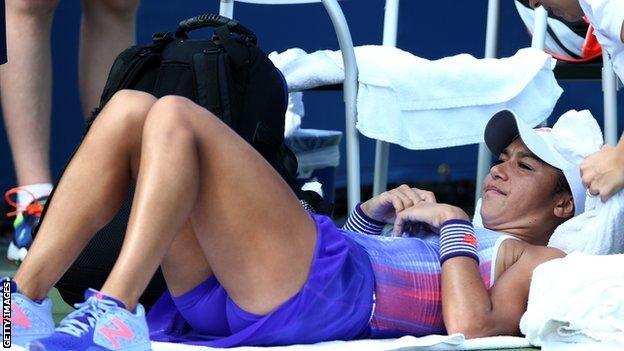Heather Watson: British number two out of Wuhan Open with illness
- Published

Heather Watson needed medical treatment during her 6-2 7-5 US Open first-round defeat by Richel Hogenkamp
Heather Watson was forced to pull out of her opening match at the Wuhan Open with illness, days after saying she had fully recovered from the problems which affected her US Open campaign.
The British number two withdrew against American Madison Brengle in China after complaining of dizziness.
British number one Johanna Konta comfortably reached round two after beating German Annika Beck 6-1 6-2.
Konta, the 11th seed, will play China's Zhang Shuai in the second round.
Konta needs a strong result in the tournament to pass American Madison Keys and Spain's Carla Suarez Navarro in the race to qualify for the WTA Finals later this month, which features the season's top-eight players.
Guernsey-born Watson, 24, was suffering from a stomach bug when trailing her opponent 3-6 1-2 in mid-30C temperatures before pulling out on Monday.
"It came on this morning. I woke up in full sweats. I went out there to see how I feel but it wasn't great," said Watson, who also named John-Laffnie de Jager as her new coach on Monday. Watson has been without a mentor since splitting with Diego Veronelli this year.
"I was getting goosebumps on the court and that is the worst feeling, especially when it is hot," she added.
"It is frustrating, especially because I had a couple of matches under my belt and I was starting to feel good on court, so it is a shame this happened but there is nothing I can do."
Watson called for a medical time out after losing the opening set and a doctor was called onto court to take her blood pressure.
On Saturday, Watson won twice to qualify for the event in her first singles matches since requiring medical treatment following last month's US Open defeat by Richel Hogenkamp of the Netherlands.
After qualifying in China, Watson said tests were "all fine" amid fears she had suffered a relapse of glandular fever, which affected her in 2013.
- Published25 September 2016

- Published25 September 2016

- Published25 September 2016

- Published17 June 2019

- Published9 November 2016
